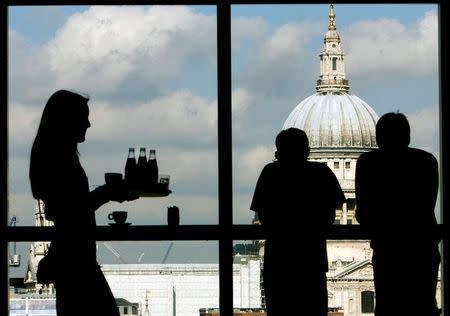UK consumer lending slows, caution reigns ahead of Brexit
By Andy Bruce and Alistair Smout LONDON (Reuters) - British consumer borrowing grew at its weakest rate in nearly two years over the past three months, Bank of England data showed on Wednesday, highlighting households' sense of caution as Britain moved closer to leaving the European Union. Sterling's slide since last year's vote to leave the European Union is pushing up inflation, squeezing consumers and starting to undermine spending, one of the main factors to drive last year's solid economic growth. Unsecured consumer lending in the three months to February rose at the weakest rate since July 2015 as annualised growth slowed sharply to 8.7 percent from 10.1 percent in January - a far cry from November's recent peak of almost 12 percent. In cash terms, borrowing in February alone fell to 1.441 billion pounds from 1.609 billion in January - slightly beating economists' forecasts in a Reuters poll for a drop to 1.3 billion pounds and giving sterling a small fillip. Overnight the currency had fallen to an eight-day low against the U.S. dollar, hours before Prime Minister Theresa May was due to trigger two years of negotiations to take Britain out of the European Union. The outlook for consumer spending is critical for Britain's economy ahead of the divorce with the EU. Consumers kept up their spending in 2016 after June's Brexit referendum shock but there have been signs that they are turning more wary. With inflation surging past the BoE's 2 percent target - fuelled in part by the pound's fall of more than 15 percent after June's Brexit vote - BoE policymakers are watching closely for signs of a slowdown as rising prices erode spending power. "Slowing credit growth is another factor compounding the shrinking role of consumer spending this year," said economist Jack Coy from the Centre for Economics and Business Research consultancy. BoE Governor Mark Carney has noted how Britain's growth relied on consumers, although the Bank has said British exporters are benefiting from the fall in the value of the pound, possibly helping offset a slowdown in domestic demand. A Reuters poll of economists this month suggested economic growth will slow from 1.8 percent in 2016 to 1.6 percent this year, and then 1.2 percent in 2018. [ECILT/GB] Wednesday's figures from the BoE showed that the number of mortgages for house purchase approved by lenders fell to 68,315 in February from 69,114 in January, below the median forecast of 69,900 in the Reuters poll. Economists expect house prices to rise just 2.5 percent this year, after growth of 7 percent in the 12 months to December. (Editing by Alison Williams)

 Yahoo Finance
Yahoo Finance 

